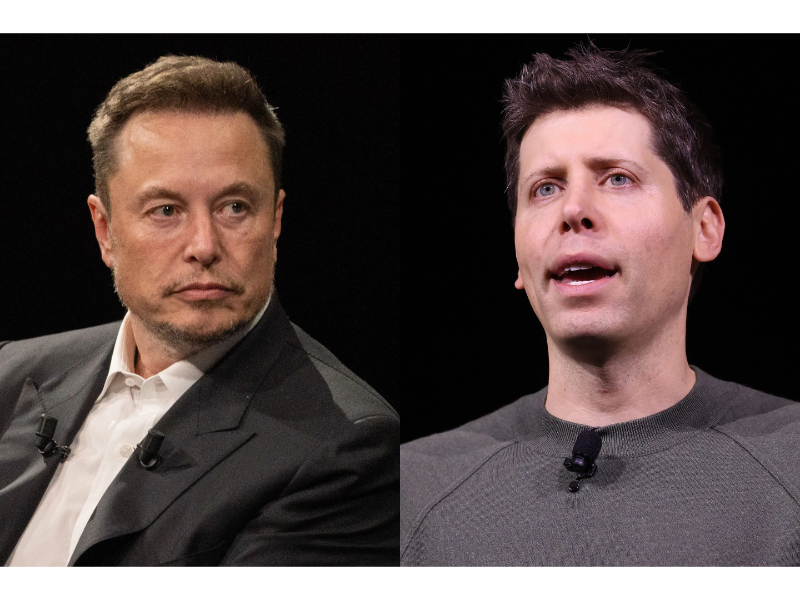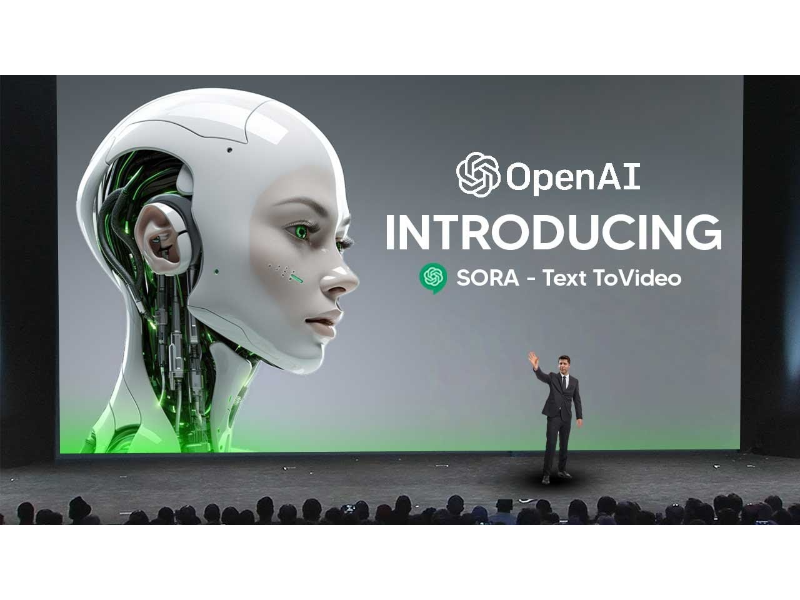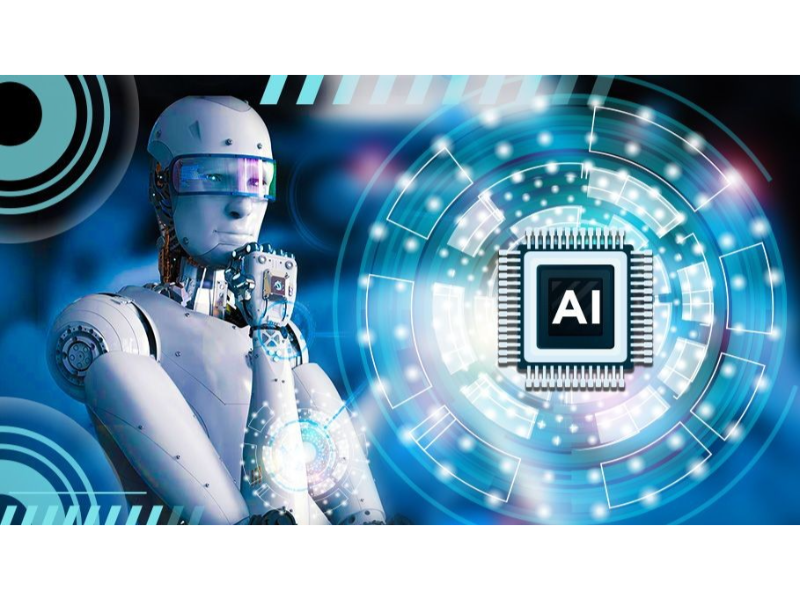- OpenAI, a prominent organisation in AI research, is shaping discussions on the ethical and societal impact of AI technology.
- Through insights from CEO Sam Altman, the renowned AI researcher Lex Friedman‘s podcast explores legal disputes, innovative AI models like Sora and GPT-4, and emphasises the importance of responsible leadership in AI development.
- Altman addresses the capabilities and limitations of the groundbreaking AI models GPT-4 and GPT-5, emphasising the importance of responsible development practices and collaboration in navigating the future of AI technology.
Popular podcaster Lex Fridman recently hosted OpenAI CEO Sam Altman, for the second time, to discuss all things AI. The two-hour conversation covered many topics in a candid style, starting with the chaotic weekend of a few months ago when Altman was fired by the OpenAI board, replaced, but then rehired and allowed to form a new board. Altman described those days and weeks as among the most painful and upsetting of his career. But the conversation moved on to more tech-focused things, and we wanted to provide a snapshot of the most interesting points.
OpenAI, founded by Altman and Elon Musk, is a leading organisation in AI research and development, and has been at the forefront of shaping this narrative. Join us as we explore the dynamic landscape of AI development through the lens of Sam Altman and OpenAI, gaining invaluable insights into the future of technology and its impact on society.
Also read: Sam Altman’s $7 trillion quest for network of AI chip factories
Also read: Who is Sam Altman? A tech and venture capital visionary whose rapid rise in AI signalled the start of a new era in computing
Also read: OpenAI boardroom coup: Sam Altman fired, hired by Microsoft to head new advanced AI research unit
1. That lawsuit filed by Elon Musk – is he serious?

OpenAI CEO Sam Altman provided insights into the lawsuit filed by Elon Musk against OpenAI and shed light on the company’s evolution and vision.
Altman addressed Musk’s criticism, highlighting the initial uncertainty surrounding OpenAI’s direction as a small research laboratory. He emphasised that at its inception, OpenAI focused solely on research and lacked plans for API access or commercialisation of chatbots. Altman acknowledged the gradual evolution of OpenAI’s structure in response to emerging needs and the quest for additional capital.
We want to put increasingly powerful tools in the hands of people for free and get them to use them. I think that kind of open is really important to our mission.
Sam Altman, CEO of OpenAI
Regarding Musk’s motivations, Altman expressed uncertainty but suggested that Musk’s desire for full control and divergent visions for the company led to the split. Altman refuted claims that Musk’s lawsuit aimed to enforce control or dictate OpenAI’s direction, emphasising the importance of maintaining the company’s mission and independence.
Altman discussed OpenAI’s commitment to open access to powerful AI tools for public benefit, citing the decision to offer free versions of its models without advertisements or other monetisation strategies. He stated:” We want to put increasingly powerful tools in the hands of people for free and get them to use them. I think that kind of open is really important to our mission. ” He underscored the significance of the “open” aspect of OpenAI’s mission, despite challenges in balancing openness with business considerations.
Regarding the lawsuit’s impact, Altman downplayed its legal seriousness, suggesting it primarily served as a platform for discussing the future of AGI and the company’s leadership role. He expressed disappointment with the adversarial nature of the dispute, contrasting it with constructive competition. He said:”I don’t think the lawsuit is legally serious. It’s more to make a point about the future of AGI and the company that’s currently leading the way.”
On the topic of open-sourcing AI models, Altman recognised the market demand for accessible models and acknowledged that both open and closed-source models would coexist in the ecosystem. He emphasised Meta’s and Google’s strides in open-sourcing AI models and highlighted the benefits and challenges of such initiatives.
Regarding the precedent set by OpenAI’s transition from a non-profit to a for-profit entity, Altman discouraged other startups from following suit, citing legal complexities and potential conflicts of interest.
Altman expressed hope for a harmonious relationship with Musk in the future, emphasising mutual respect and a shared commitment to innovation.
The interview provided valuable insights into OpenAI’s journey, the complexities of AI development, and the dynamics of the tech industry’s leading figures.
2. Sora is able to simulate three-dimensional physics convincingly

Lex Fridman and Sam Altman delved into the technological and philosophical implications of AI, particularly focusing on Sora, OpenAI’s latest advancement in AI capabilities.
Altman highlighted the significant strides made in understanding the world through AI models like Sora, emphasising that these models often possess a deeper comprehension than commonly acknowledged. He stated:”I think all of these models understand something more about the world model than most of us give them credit for.” Despite some limitations and weaknesses, the continual progress of these models remains impressive, especially evident in Sora’s ability to simulate three-dimensional physics convincingly.
Regarding the training process, Altman mentioned the substantial use of human-labeled data, although specifics about Sora’s methodology were not disclosed. He emphasised the importance of ensuring efficiency and addressing potential risks before the system’s release, particularly in areas like deepfakes and misinformation.
Furthermore, Altman discussed the ethical considerations surrounding AI-generated content and the need for fair compensation for creators whose styles are replicated by AI systems like Sora. He emphasised the ongoing evolution of economic models to accommodate these changes.
Looking ahead, Altman expressed optimism about AI’s role in enhancing human productivity and creativity, foreseeing a future where AI tools enable individuals to operate at higher levels of abstraction. While acknowledging the enduring appeal of human-generated content, he also recognised the potential for AI to streamline content creation processes, akin to tools like Adobe Suite.
Altman stressed the need for thoughtful consideration and ethical guidelines as AI continues to advance, ensuring that it remains a force for positive change while respecting human creativity and autonomy.
Also read: Sora won’t replace humans, and here’s why
Pop quiz
What is the most difficult part in increasing computational power?
A. Energy
B. Human capital
C. Collaboration
D. None of the above
The correct answer is at the bottom of the article.
3. GPT-4 is impressive yet imperfect in the nature
With Lex Friedman, Sam Altman shared insights into the capabilities and limitations of the groundbreaking AI model GPT-4, shedding light on its potential impact on various fields.
Altman reflected on the awe-inspiring advancements of GPT-4, likening its significance to historical milestones such as the emergence of GPT-3 and ChatGPT. However, he tempered the enthusiasm by highlighting the imperfections and the need to continuously strive for improvement. He said:” I expect that the delta between 5 and 4 will be the same as between 4 and 3 and I think it is our job to live a few years in the future and remember that the tools we have now are going to kind of suck looking backwards at them and that’s how we make sure the future is better.”
The discussion delved into the most remarkable aspects of GPT-4, with Altman emphasising its role as a collaborative brainstorming partner rather than just a tool for specific tasks like programming or writing. He noted its ability to break down complex tasks into manageable steps and its potential to handle longer-term projects, albeit with occasional limitations.
Regarding the expansion of context size from 8K to 128K tokens in GPT-4 Turbo, Altman suggested that while it holds promise for the future, current usage patterns often do not require such extensive context. However, he envisioned a future where AI models could leverage vast amounts of historical data to provide deeper insights into users’ needs and preferences.
Altman underscored the importance of ensuring the accuracy and reliability of AI-generated content, particularly in fields like journalism where misinformation can have serious consequences. He acknowledged the need for continued efforts to address the challenge of distinguishing between factual information and persuasive yet false content generated by AI models.
The interview concluded with a call for responsible journalism practices and a commitment to promoting high-quality, balanced reporting in the face of click-driven incentives. Altman expressed optimism about the potential for AI technology to enhance human capabilities but stressed the importance of maintaining ethical standards and accountability in its development and deployment.
The conversation between Friedman and Altman offers valuable insights into the evolving landscape of AI technology and its implications for various sectors, highlighting the need for continued collaboration and vigilance to harness its full potential for the benefit of society.
4. The need for collaboration in AI innovation like GPT-5

Sam Altman talked about the future of AI development, including the potential release of GPT-5 and the challenges involved in its creation.
Altman expressed uncertainty about the release date of GPT-5 but hinted at the imminent launch of a groundbreaking new model from OpenAI. He emphasised the importance of addressing various challenges, both technical and computational, in the development of AI models like GPT-5.
The discussion highlighted the collaborative nature of AI innovation, with Altman underscoring the need for integrating contributions from diverse teams and individual contributors into a cohesive framework. He emphasised the value of maintaining a broad understanding of the AI landscape while also delving into specific technical details.
Altman reflected on his evolving role within the tech industry and the importance of maintaining a comprehensive understanding of emerging technologies to drive innovation. He noted the invaluable insights gained from considering the broader implications of technological advancements and their potential impact on society.
The conversation concluded with a recognition of the dynamic nature of the tech industry and the necessity of adapting to new challenges and opportunities. Altman acknowledged the transformative potential of AI technology while also highlighting the need for responsible development practices and ethical considerations.
The interview with Altman offers valuable insights into the ongoing evolution of AI technology and the collaborative efforts required to push the boundaries of innovation. As OpenAI continues to pioneer new developments in the field, Altman’s vision for the future underscores the importance of interdisciplinary collaboration and a holistic understanding of technological advancements.
5. Computational power is vital in shaping the future of AI

Sam Altman discussed the future of AI development and the challenges ahead. Altman clarified misconceptions regarding a statement attributed to him on Twitter about raising $7 trillion. He emphasised the importance of computational power in shaping the future of AI, suggesting that it could become the most valuable commodity globally. He stated:”I think the world is going to want a tremendous amount of compute. And there’s a lot of parts of that that are hard. Energy is the hardest part, building data centres is also hard, the supply chain is hard, and then of course, fabricating enough chips is hard. But this seems to be where things are going. We’re going to want an amount of compute that’s just hard to reason about right now.”
I think the world is going to want a tremendous amount of compute. And there’s a lot of parts of that that are hard. Energy is the hardest part, building data centres is also hard, the supply chain is hard, and then of course, fabricating enough chips is hard. But this seems to be where things are going. We’re going to want an amount of compute that’s just hard to reason about right now.
Sam Altman, CEO of OpenAI
Regarding energy challenges, Altman expressed belief in nuclear fusion as a solution. He highlighted private companies like Helion as leaders in fusion technology and advocated for revitalising the nuclear fission industry.
Concerning AI’s societal impact, Altman acknowledged potential risks and emphasised the importance of balanced narratives to address public concerns. He discussed the politicisation of AI and the need for collaboration in ensuring its safe development.
Altman reflected on the competitive landscape in AI development, citing advantages such as innovation and lower costs but cautioning against an arms race mentality. He stressed the importance of prioritising safety in AGI development to mitigate risks.
The interview concluded with a discussion on leadership in the tech industry, with Altman expressing respect for figures like Elon Musk while emphasising the need for collaboration and responsible leadership.
Altman’s insights shed light on the complexities of AI development and underscore the importance of collaboration, safety, and responsible leadership in navigating its future. As OpenAI continues to push the boundaries of AI innovation, Altman’s perspective offers valuable guidance for the industry’s stakeholders.
The correct answer is A, energy.
